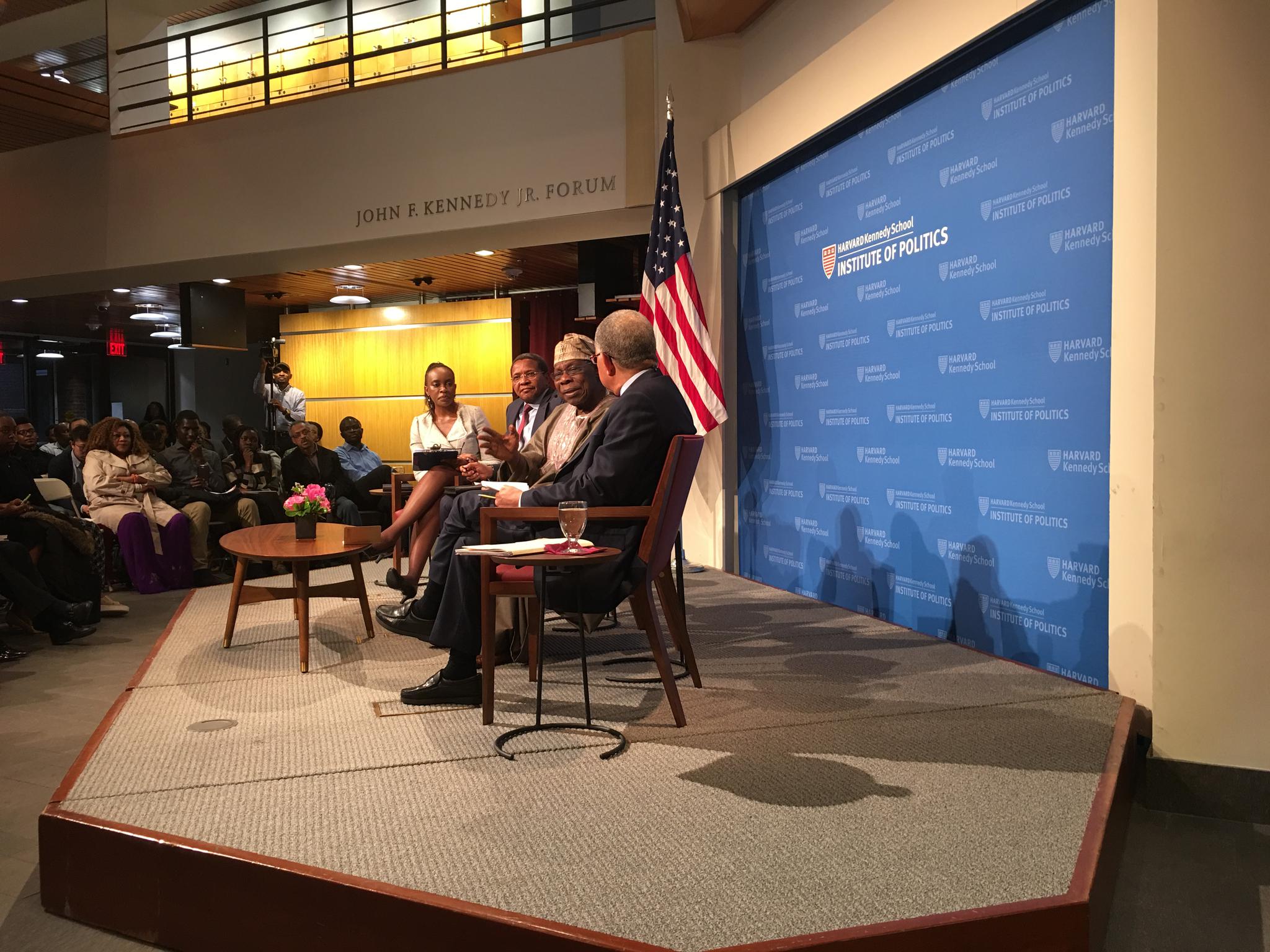April 25, 2018: Former African Leaders Join in Conversation at Harvard University
Over 100 people gathered this evening at the John F. Kennedy School of Government at Harvard University, to join in conversation with former Tanzanian President, Jakaya Mrisho Kikwete, former Nigerian President, Olusegun Obasanjo, and former Cape Verdean Prime Minister, Carlos Veiga, to hear their about experiences and insight on leadership in Africa.
Thoko Moyo, Associate Dean of Communications and Public Affairs at Harvard Kennedy Law School, moderated the “Public Leadership and Africa's Developmental Agenda” forum.
The three former heads of state shared stories and wisdom gained from their time as leaders in their respective countries. They also discussed development in Africa and how it can be achieved through effective leadership and strong institutions.
Early on in the conversation, Obasanjo provided everyone with comic relief, despite the conversation surrounding major topics.
Moyo shared that on his first visit to Africa, former United States President, Barack Obama, emphasized that responsible leadership in Africa was much needed. Moyo shared that Obama said “Africa doesn’t need strong men, it needs strong institutions.” When Moyo asked Kikwete his thought on this, he replied “I don’t know what context President Obama talked about that,” to which Obasanjo interjected, “to whatever context!” and laughter spread throughout the room like wildfire.
“In whatever context, it’s wrong. Africa needs good, strong, firm leadership, and we need very strong, stable institutions. It is neither one nor the other, we need both of them,” Obasanjo added. Kikwete agreed with the assertion, that both strong leadership and strong institutions is the essential combination to enhance life in Africa.
“We need very stable, strong, vibrant institutions. If you have strong institutions and weak leaders those institutions will be undermined. If you depend only on strong leaders without strong institutions, what happens when the strong leader isn’t as strong as they seem,” said Obasanjo. Obasanjo spoke slowly, in a deep, bold voice that captured the undivided attention of the audience; yet he equally spread belts of laughter throughout the room quite often, even among the speakers and Moyo.
Veiga explained leadership from his experiences, and what makes a leader effective. Veiga said, “we are happy because since independence, there is leadership in the country.”
Veiga said an important aspect of leadership is “to be committed to the country and try to do the best to serve the people. You can be wrong, that is normal, but you can change what’s wrong. Even if I don’t agree with the people...I need to recognize that they were committed to the country,” said Veiga. Kikwete highlighted that while Africa needs work, there are countries in Africa that have come a long way. “Of course when you compare with other continents, we still are behind, but compared to where we came from and where we are now there has been significant progress, and there needs to be more,” said Kikwete.
Teaching and graduate fellow at the Harvard Graduate School of Education, Lerato Motshwarakgole, from Botswana said, “I think it's very evident that certain countries in Africa dominate. Cape Verde democratically is doing incredibly well, but you’ll never hear of them because they’re an island nation. I find Nigeria definitely dominates the conversation a little bit. I wanted to hear more from the former Cape Verde Prime Minister because they really have, in terms of evidence, a great track record compared to Tanzania and Nigeria.”
Motshwarakgole also pointed out the importance of forums like this one, especially for young people. “I think it's important for young people to have some sort of insight into the past leaders and hold them accountable as much as possible, publicly and privately.” Motshwarakgole said she found the forum fascinating, and that although she couldn’t relate to all the examples the speakers discussed, she still “liked how they spoke with specificity about their own situations.”
In discussing their respective situations, a conversation about Nelson Mandela and his impact on Africa took place.
“I have two people that I admired, my father and Nelson Mandela,” said Veiga. Veiga also said that Nelson Mandela provided lifelong lessons for the people of Africa to fight against injustice and oppression.
Obasanjo explained the remarkable first impression that Mandela made on him when he met Mandela while he was in prison. “He was very, very clear what he wanted for his country,” Obasanjo said.
Obasanjo also emphasized what he found most remarkable about Mandela, was his ability to forgive; specifically, forgive the people who imprisoned him.
“I think that you require something more than a normal human to be able to do that. I think we need to learn that from Mandela, and we need to practice it. Forgiveness, is one thing that we do forget in love, and in our interaction with our fellow human beings...love and forgiveness,” Obasanjo said, and a sea of applauds followed.

(A piece of classwork assigned by Professor Mitchell Zuckoff at Boston University)
